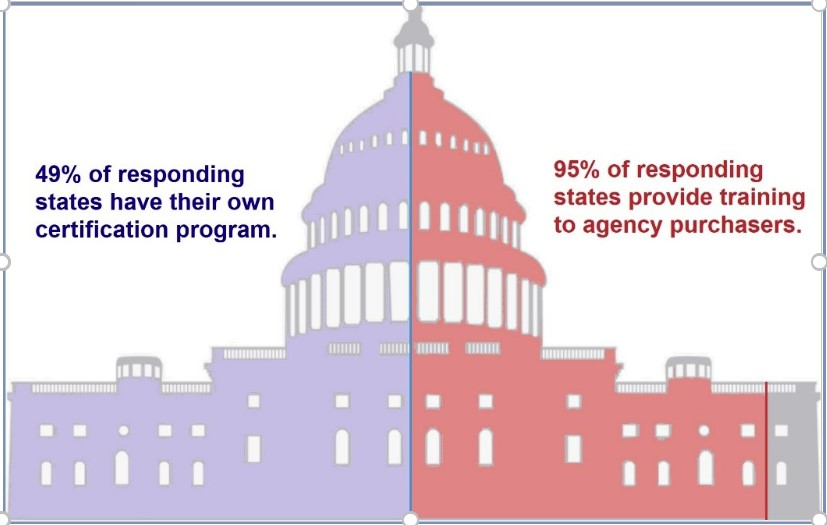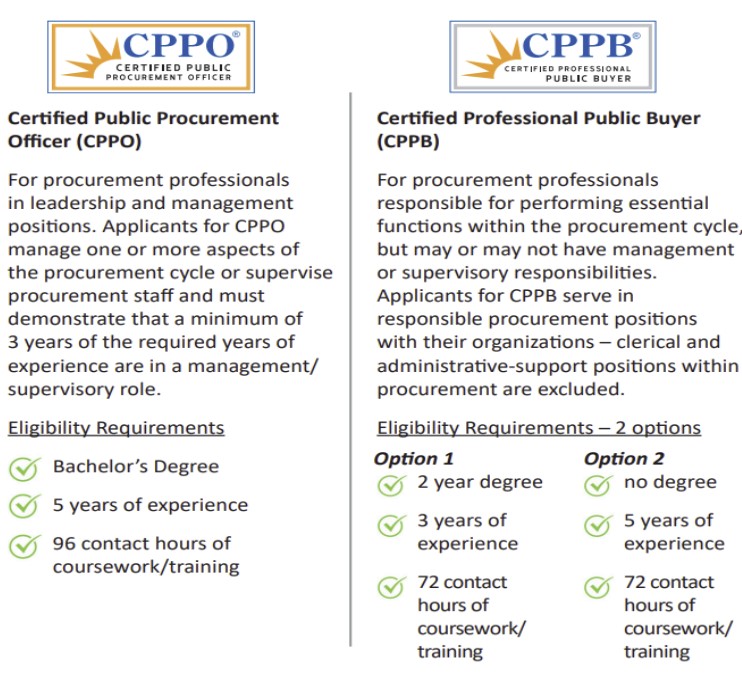A 2015 academic study found nearly 3 out of 4 public procurement managers were more likely to hire someone with a procurement certification. A 2018 study by the Bureau of Labor Statistics concluded that persons with a professional certificate or license earned nearly one-third more than those without, including a weekly median salary difference of 12.4% for office and administrative support occupations. There are plenty more reasons why you should consider continuing education and why your office should value it.

According to NASPO’s 2020 Survey of State Procurement Practices, 95% of responding states provide procurement training to agency purchasers, and nearly half of the states have their own certification program for purchasing. These results speak to the value of educational resources for procurement officials nationwide. Procurement offices should invest in professional development to benefit the individual, the organization, and the community as a whole.
Why settle for just good enough?
Many public entities rely on training to bridge the gap in skills between the available workforce and what they need to effectively operate. For procurement offices, the professionalization of roles comes via certification. The benefits of professional certification are numerous, ranging from tangible financial and professional gains to the more abstract feelings of achievement and satisfaction. These benefits start at the individual level but often ripple outward.
For you:
- Building professional recognition and increasing credibility within the profession
- Growing knowledge, skills, and competency
- Broadening employment or advancement opportunities
- Increasing earning potential during a career
For the state and office:
- Cultivating skills and professionalism of procurement officials
- Achieving better purchasing and contracting outcomes from improved staff competencies
- Providing professional development opportunities for staff recruitment and retention
- Creating objective benchmarks for evaluating skills
When combined, these benefits expand to the government as a whole, its constituents, and stakeholders in the form of more responsible stewardship and expenditure of public funds and better resources and services for communities. Next, we look at some examples of state procurement offices that have implemented effective training and certification solutions.
Supporting Their Staff
Georgia’s Department of Administrative Services (DOAS) provides robust training offerings, including on-demand and instructor-led virtual courses, that cover everything from the basics of public procurement to using the state’s purchasing software and leveraging statewide contracts. DOAS also oversees the state’s certifications for purchasing associates and purchasing managers. The GCPA and GCPM certifications feature educational pathways tailored for state agency officials, college and university officials, and local government purchasers.
The Virginia Institute of Procurement (VIP), operated by the Division of Purchasing and Supply, administers a four-tiered certification system at Associate, Officer, Master, and Risk Management levels. While still offering annual in-person learning opportunities, the primary focus of VIP is its online learning management system. Their approach was designed with a multi-generational workforce in mind, offering courses on soft skills, procurement processes, and state-specific policies and regulations. Data generated by the Learning Management System (LMS) helps to identify skill gaps for future address.
During the COVID-19 pandemic, Florida’s Division of State Purchasing was forced to move its MyFloridaMarketPlace University (MFMP U) and the Florida Certified Contract Manager (FCCM) program to a virtual format to facilitate training a remote purchasing staff. This presented an opportunity to significantly expand course offerings and implement a subsequent advertising campaign to promote the switch which reached a broader audience of public servants. The move has resulted in a dramatic increase in program registration while lowering training-related costs.
Similarly, Michigan Central Procurement Services adapted its Achievement in Michigan Procurement (AMP) certification program to be fully online, including instructor-led training courses and proctored exams. The AMP Level 1 certification is mandatory for new procurement professionals in both central procurement and agency purchasing offices. An emergency procurement course was added to the curriculum to train purchasers for pandemic response. The move allowed the state to successfully onboard new staff remotely.
Keeping these programs online helps to better facilitate remote workers, expand the accessibility of the programs, promote digital equality in state government, and broaden the talent pool for recruitment.
Traveling With You
Beyond state-specific programs, the Universal Public Procurement Certification Council (UPPCC) provides certification based on best practices for all public procurement. NASPO and the National Institute for Governmental Purchasing (NIGP) jointly established UPPCC as an independent organization in 1978 to grow professionalism and distinction for public purchasers. UPPCC administers two globally recognized public procurement certifications, the CPPB and CPPO, and is accredited by the International Federation of Purchasing and Supply Management. Over 14,000 professionals hold one or both of these certifications.

NASPO Training Resources
NASPO offers an abundance of training and educational resources suited for public procurement officials at any stage of development, from the beginning purchaser to the CPPO. NASPO’s Procurement U courses and materials are carefully aligned with the UPPC Body of Knowledge and are a great IACET-accredited source for continuing education contact hours (CEUs).
For 2022, Procurement U is offering all procurement-focused courses free of charge. This includes all preparatory materials for taking the CPPB and CPPO exams. Be sure to check out the new Introducing Sustainability into the Procurement Process course developed in partnership with GEC.
Procurement U also offers a suite of professional skills-focused courses, moving beyond procurement practices. Let NASPO partner with your office to support your professional development needs.
